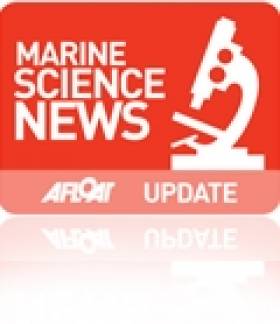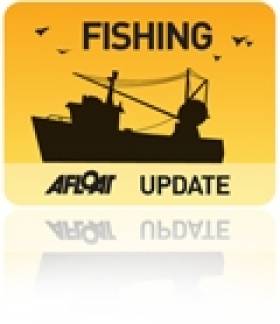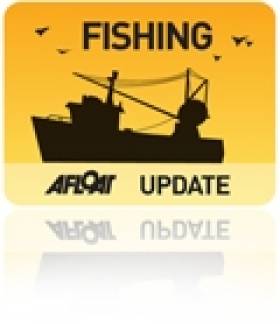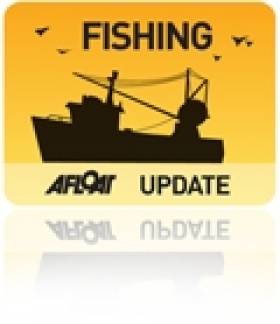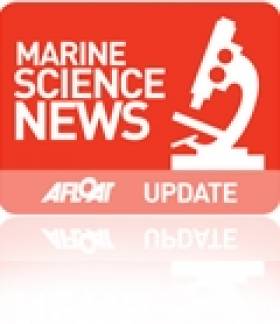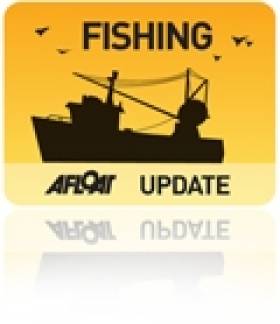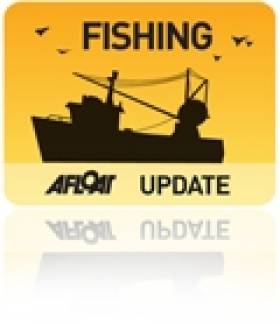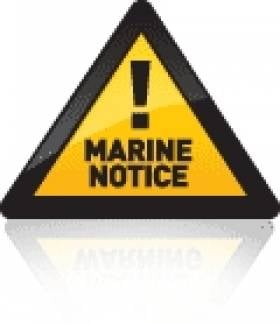Displaying items by tag: Fishing
Fisherman's Body Recovered From Howth Harbour
#Howth - The Irish Times reports that the body of a fisherman was recovered from Howth Harbour early yesterday morning (Friday 9 January).
The Latvian national, who was a longstanding member of the local fishing community, is thought to have fallen between two trawlers overnight.
It's also believed to have been in the water for some time before being discovered.
The body was removed to Connolly Hospital in Blanchardstown and a post-mortem was scheduled to be carried out yesterday afternoon.
#MarineScience - The Marine Institute has carried out Ireland's obligations under the Data Collection Framework (DCF) since 2002. The DCF programme involves at-sea and port sampling of catch and landings, research vessel surveys (eg acoustic, egg, groundfish and underwater TV surveys), management and analyses of data, assessment and provision of scientific advice on the sustainable exploitation of fisheries resources.
Ireland has secured funding under the EMFF (European Maritime and Fisheries Fund 2014 to 2020) to support the implementation of the new DCF and to build capacity in the areas of Regional Fisheries Management Plans; Mixed Fisheries Plans and Regional Discard Plans; in addition to discard and groundfish survey data analyses.
To support delivery of these work programmes the Marine Institute is recruiting two posts: a Team Lead (TL) focused on providing fisheries modelling and simulations support for Regional Fisheries Management Plans; Mixed Fisheries Plans and Regional Discard Plans; and a Scientific and Technical Officer (STO) to work with our Fisheries Ecosystem Advisory Services (FEAS) team to focus on the analyses of discard and groundfish survey data.
The TL will provide statistical support for staff in relation to analyses of data for peer reviewed publications as well as develop assessment methods for data limited stocks particularly monk and megrim in ICES Sub Areas VI and VII.
If you have an interest in working with the FEAS team and believe you have the skills and experience required for either of these roles, then the the Marine Institute would like to hear from you.
Further information about the opportunities can be found in the detailed job descriptions that be downloaded from www.marine.ie.
Please send a detailed letter of application and an up-to-date CV to Human Resources, Marine Institute, Rinville, Oranmore, Co Galway or email to [email protected]. Please note email applications will only be accepted at this address and applications are not valid until you have received confirmation of your application. All applications should include the reference for the relevant vacancy.
The closing date for receipt of applications is 5pm on Wednesday 21 January 2015. Late applications will not be accepted. The Marine Institute is an equal opportunities employer.
New Lobster Measures Bad For Business & Stocks Says Fisheries Leader
#Lobster - Ireland's Marine Minister "is displaying no scientific understanding, and leaving older lobsters in the sea to die" in his new measures to protect lobster stocks, according to an inshore fisheries leader.
As reported yesterday on Afloat.ie, Minister Simon Coveney signed into law new conservation measures that introduce a new maximum landing size of 127mm, in order to preserve larger lobsters and enhance the reproductive potential of the stock.
The move follows the introduction earlier this year of an enhanced 'V-notching' programme to mark lobsters that should not be re-caught. And the minister has allowed for a two-year transition for lobstermen to avail of financial assistance to V-notch oversize lobsters and return them alive.
But Eamon Dixon, chair of the North-West Regional Inshore Fisheries Forum, told The Irish Times that fishermen would be put out of business by the "crazy" new landing size limit, well above the 89mm previously proposed.
Dixon added that the changes "will do nothing to protect the stock, and will only anger fishermen who had asked [the minister] to defer any change until the new regional inshore fisheries forums were up in action."
The Irish Times has more on the story HERE.
#lobster – The Minister for the Marine, Simon Coveney T.D., has signed into law, conservation measures as part of an integrated package to protect the long-term sustainability of lobster and shrimp stocks.
Lobster & Shrimp stocks are vital stocks for the important inshore fisheries sector and these stocks have been under increased fishing pressure requiring a number of conservation measures to ensure their sustainability.
In May, the Minister announced that the rate of financial assistance provided to fishermen for v-notching lobsters was increased to 75% of the market value. Figures from BIM, which administers the lobster v-notching programme, indicate that the number of lobsters v-notched in 2014 was more than double the numbers of recent years, with some €250,000 of funding supporting the return of more than 30,000 berried female lobsters to the sea this year.
As part of the Minister Coveney's announcement in May he also published the results of an extensive consultation process on lobster and shrimp management and announced that he had approved plans to revise conservation measures for these stocks. Following the success of the enhanced v notching programme for Lobsters and the completion of the consultation exercise the Minister is now enhancing the conservation measures further as part of an integrated approach. Under the new protection measures for lobster, a maximum landing size of 127mm is being introduced to support the reproductive potential of the stock. The retention of very large Lobsters in the Lobster stock are known scientifically to greatly enhance the reproductive potential of the stock and help to ensure its future sustainability.
Minister Coveney said, "I am greatly encouraged by the upsurge in v-notching conservation activity since my announcement in May. Lobsters are one of the most important species to the inshore sector and we need to work to ensure the long-term future of this valuable stock."
To ease the introduction of the new measure, during the first two years of this new measure's operation fishermen can avail of financial assistance for v-notching 'oversize' lobsters and returning them alive to the sea as a conservation measure. In the case of the shrimp fishery the new measures will see an earlier closing date of 15 March, instead of 1 May, commencing in 2015. This will improve stock protection during the critical shrimp spawning period.
Tense Whitefish Quota Negotiations Continue
#whitefish – The Minister for the Marine, Simon Coveney TD, took part in 'very difficult' fishing meetings yesterday on the deep cuts to white fish quotas proposed by the Commission which continued late last night.
Early morning meetings continue on difficult negotiations on quota allocations.
The Minister is insisting on a fair deal for Irish fishermen and a responsible science based deal for fish stocks.
The Minister stated that he is refusing to compromise on protecting the livelihoods of fishermen, when there is strong science to back up the Irish position.
There may be agreement late this afternoon / early evening but it is too early to accurately predict according to the Minister.
Fish Telemetry Workshop For Experts In January
#MarineScience - Inland Fisheries Ireland (IFI) and the Norwegian Institute for Nature Research (NINA) are hosting a workshop for scientists with experience in biotelemetry on 27-29 January 2015 at Citywest in Dublin.
Both agencies are promoting the workshop to provide practical knowledge for practitioners and to present and discuss the latest developments with regard to developing technologies.
The primary aim is to share and improve skill sets and knowledge, and to support development of an expert network with a view to future project collaboration.
Telemetry technology in fishing has made significant advances in recent years and progress is rapid in this field. The workshop will cover recent developments in technology and provide a platform for practitioners and leading experts to share and exchange experiences and to interact with one another.
It will also address considerations around designing, planning and delivering projects.
The main topics being covered are:
- Current telemetry technology
- Future requirements and advances in the tools available for tracking fish both in freshwater and at sea
- International networking considerations
- Practical requirements relating to design, planning, tag and receiver system selection, combining telemetry with other techniques (eg genetics) and tracking
- Data analysis toolkit – recognising behavioural patterns
- Ethical requirements
The workshop fee is €250 including lunch, a networking dinner and a workshop tour. Details on how to sign up can be found at the IFI website HERE.
Quota Cuts of Up to Minus 64% Proposed for Key Whitefish Stocks
#whitefish – Minister for the Marine Simon Coveney TD., has expressed his serious concern at the major threat to Irelands' whitefish fleet, ahead of the upcoming EU Fisheries negotiations in Brussels. The Minister said that the Commission had produced a devastating and unnecessary set of the most severe whitefish quota cuts.
Minister Coveney said today that "If the Commission's quota proposals remain unchanged, we are facing an overall 20% cut to our whitefish and prawn quotas for 2015. In the Celtic Sea, the Commission wants to dramatically cut the key whitefish stocks on which our fleet are dependant".
The Commission's proposal is to cut Cod by -64%, Haddock by -41%, Pollack by -20%, Skates & Rays by -20%, Whiting by -14%, Monkfish by -12% and Hake by -4%. Minister Coveney said "There are also a number of other stocks where cuts of up to 20% are proposed without an acceptable justification. These levels of cuts are not justified and are not acceptable".
The Minister added that "I presented the scale and implications of these cuts to the joint Oireachtas Committee last week. (The Whitefish Fleet is facing a loss of 5,500 tonnes of whitefish quotas if the Commission's proposals are not modified at Council). The level of cuts proposed for the whitefish fisheries are extremely worrying. What is really unacceptable to me is the fact that many of these cuts are based on a very narrow interpretation of the available scientific advice and are, in my view, completely unjustified. I can accept reductions to quotas to protect the long term sustainability of our stocks but I will not accept scientifically unnecessary cuts that would undermine the sustainability of our fishing communities."
The Minister went on to say "I am frustrated with the Commission's whitefish quota proposals and I will, with the support of our industry representatives, other stakeholders and our scientists be arguing forcefully throughout the Council for a rational application of the scientific advice."
The Minister added that "I find it especially unacceptable that, in the context of the new Common Fisheries Policy and in particular the impending ban on discards, the Commission are taking such a rigid approach to the setting of quotas for 2015."
The Minister explained that " I am committed to setting quotas in accordance with Maximum Sustainable Yield (fMSY) but, in line with the agreement I brokered on the new Common Fisheries Policy, we must phase it in where it's immediate application would seriously jeopardize the social and economic fabric of the fishing fleets impacted. The Commission proposals assume its immediate application irrespective of the socio economic implications. This is not acceptable"
The Minister will attend the EU Fisheries Council in Brussels from the 15th to the 16th of December, where quotas for the Irish fleet for 2015 will be determined. The proposals put forward from the Commission impact the Irish white fish sector in particular with severe cuts in many stocks of vital importance to Ireland. The Commission has proposed cuts to pelagic stocks such as herring, mackerel, horse mackerel and boarfish. The Minister, working with our industry, is willing to accept these cuts on the basis they are justified on the available scientific advice.
Concluding, Minister Coveney said "This is my fourth December Fisheries Council and each year it seems to get more difficult. This year looks like being the most difficult one yet. I am extremely worried that despite our collective efforts we will be presented with a fait accompli of the worst set of cuts to our quotas in recent years. I will work as hard as I can with industry and other stakeholders, as well as important Member States such as France, the UK and Spain, to try and avoid that outcome. I am however very concerned that this will be an uphill task given the scale of the whitefish cuts being proposed."
Body Of Fisherman Recovered Off Beara Peninsula
#Fishing - The Irish Times reports that the body of a fisherman was recovered off the Beara Peninsula in West Cork yesterday (Thursday 11 December).
Attempts were made to resuscitate the man, thought to be in his early 60s, but he was pronounced dead at the scene at Dinish Pier in Castletownbere.
The incident occurred shortly before the Baltimore lifeboat was called to aid a fisherman overcome by fumes elsewhere in West Cork, as reported this morning on Afloat.ie.
International Fisheries Negotiations Hosted By Ireland
#fisherynegotiations – Ireland, on behalf of the European Union, is hosting important fisheries negotiations between Norway, Sweden, Denmark, Germany, Netherlands, Belgium, France, United Kingdom, Spain, Portugal and Ireland at the National Seafood Centre in Clonakilty, Co. Cork. These negotiations, on the annual fishing arrangements for 2015 between the European Union (EU) and Norway, commence at the National Seafood Centre in Clonakilty on Monday the 1st of December.
Minister Simon Coveney stated "I very much hope that we will have a successful outcome on the exchange of fishing quotas and access arrangements which will enable the finalisation of quotas for other stocks such as Blue Whiting off the north west of Ireland and the Herring in Norwegian waters which are of major importance to our west coast pelagic fishing fleet and fish processing plants in Donegal. My delegation will be pursuing Ireland's interests to the utmost during the talks."
Over seventy delegates from across Europe and Norway will meet at the National Seafood Centre in Clonakilty for the week long talks.
These negotiations cover a wide range of fish stocks across the North East Atlantic which are jointly managed by and shared between Norway and a range of EU Member States.
Economically, these negotiations are amongst the most important for the EU fishing industry, and this final round will focus on setting Total Allowable Catches for 2015 for a range of stocks, the sharing of these stocks between the parties and substantial quota swops between the EU and Norway as well as access arrangements to each of the respective areas for the parties. The outcome has a very direct effect on the opportunities available to Irish fishermen in 2015.
The Minister went on to say that "Once again, the National Seafood Centre in Clonakilty is the venue of choice to host these important international talks and helps in the overall aim of emphasizing Ireland's positive and proactive role within the European Union. Over seventy international delegates arriving in Clonakilty for a week in December will also bring a welcome boost to the local economy".
Marine Notice: Site Investigation Works At Rossaveal Fishery Harbour Centre
#MarineNotice - The latest Marine Notice from the Department of Transport, Tourism and Sport advises that site investigation works are being carried out at Rossaveal Fishery Harbour Centre on Galway Bay.
The work comprises drilling multiple boreholes at a series of locations, subject to minor variations, as listed in Marine Notice No 65 of 2014, which is available as a PDF to read or download HERE.
Work was expected to begin on Monday 24 November and is set to finish on or around Friday 12 December, weather permitting. A jack-up barge will be moved to the various borehole locations by a tug-boat, and will remain on site overnight during the operations.
All appropriate lights will be displayed by the barge at night. Radio warnings will be transmitted on VHF Channel 16 throughout the works.



























